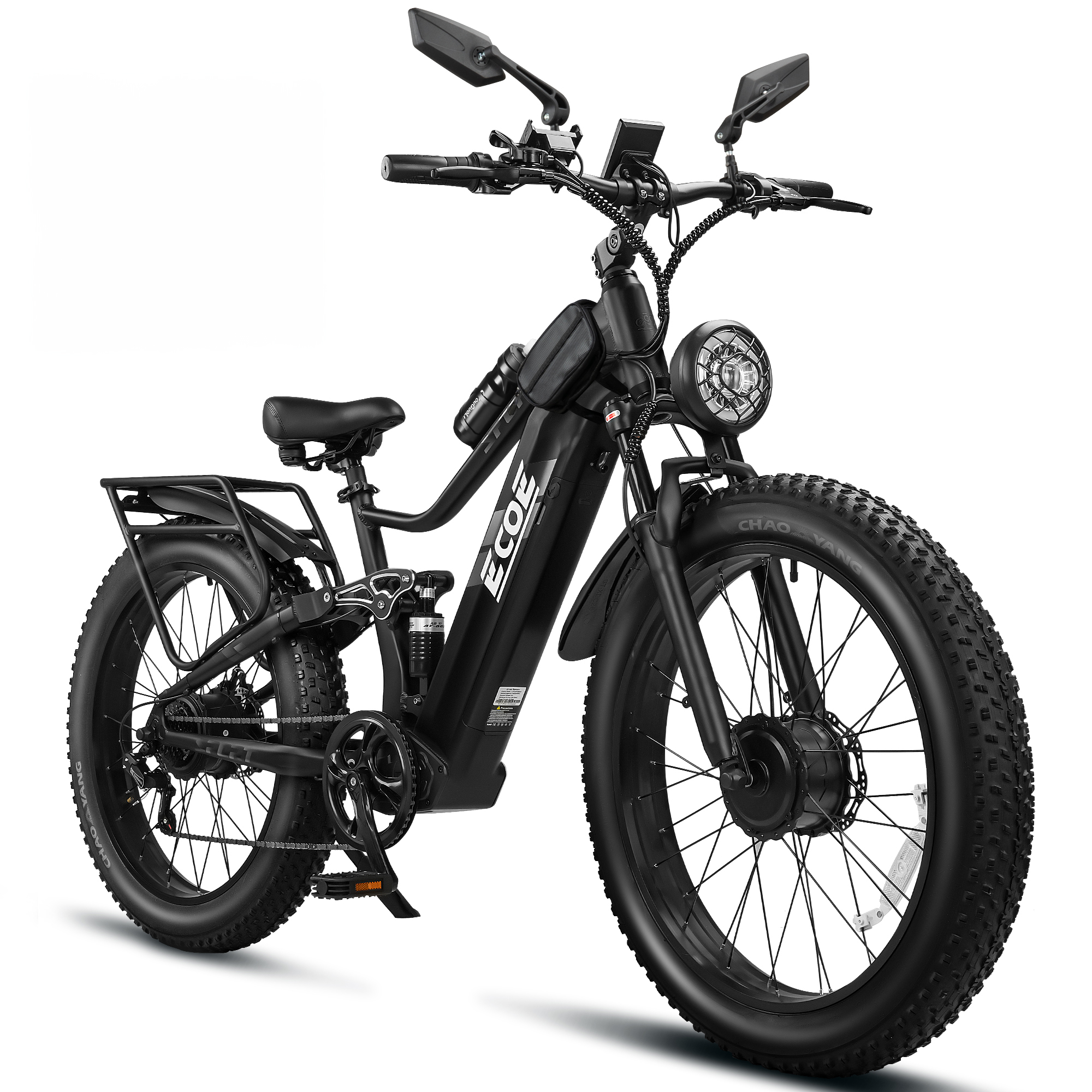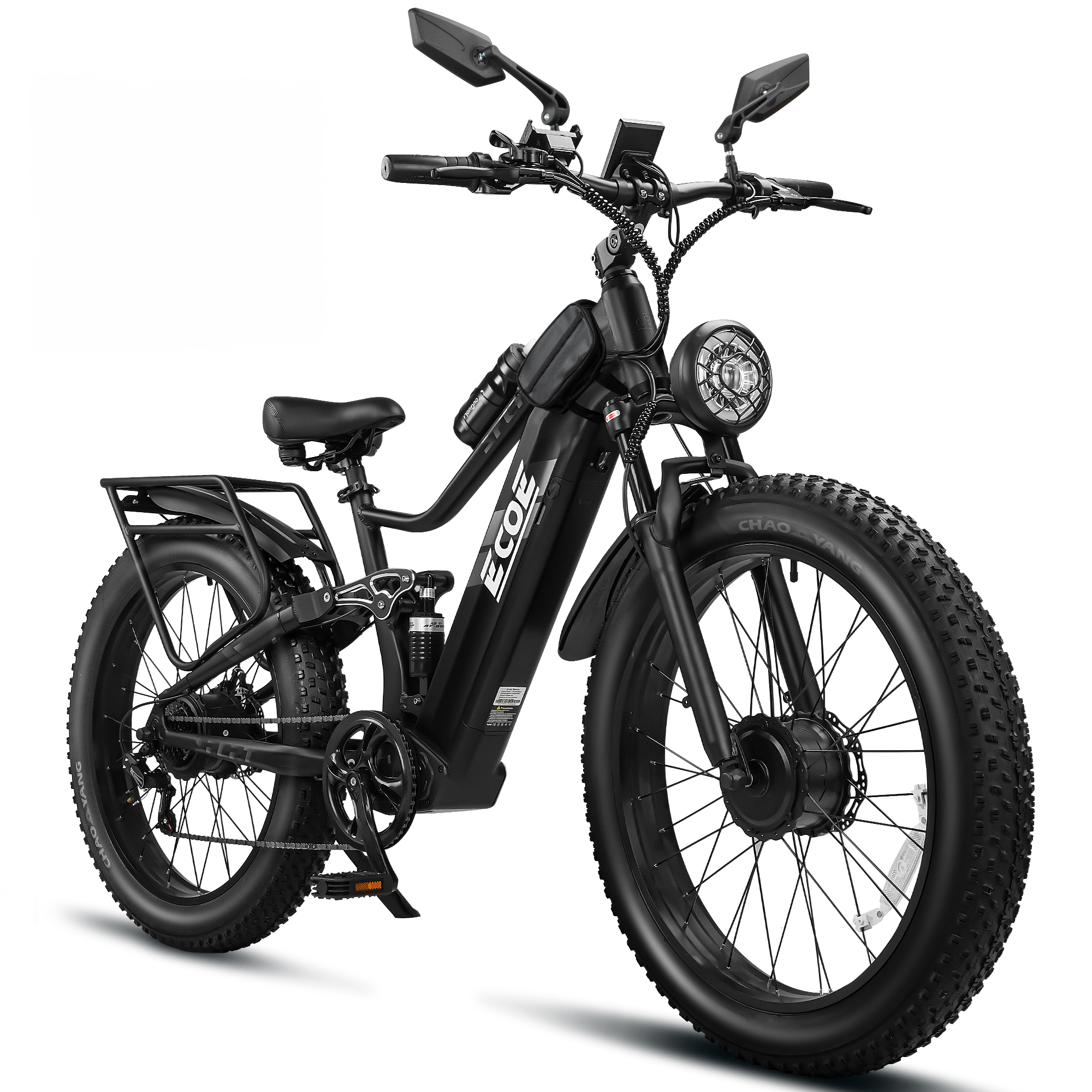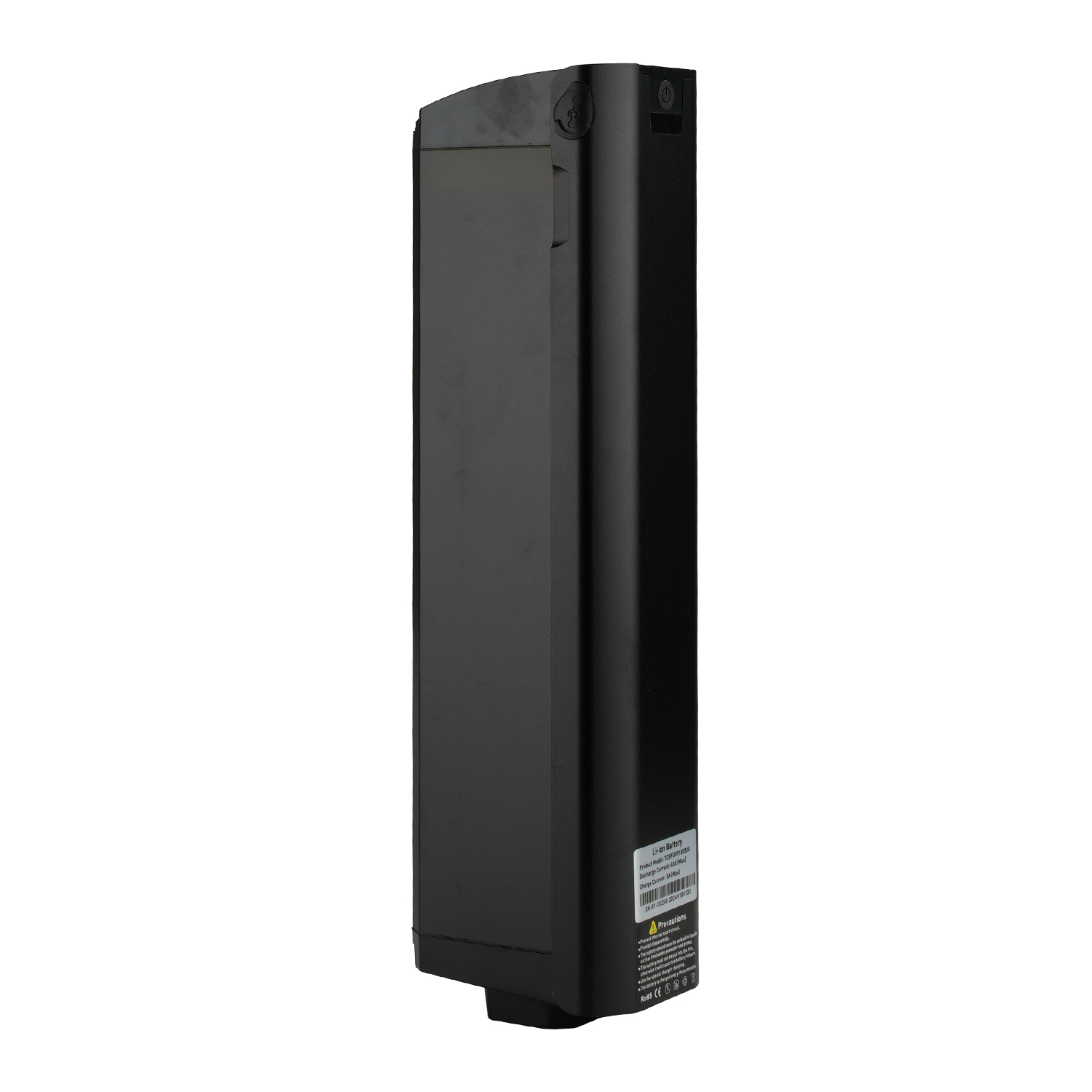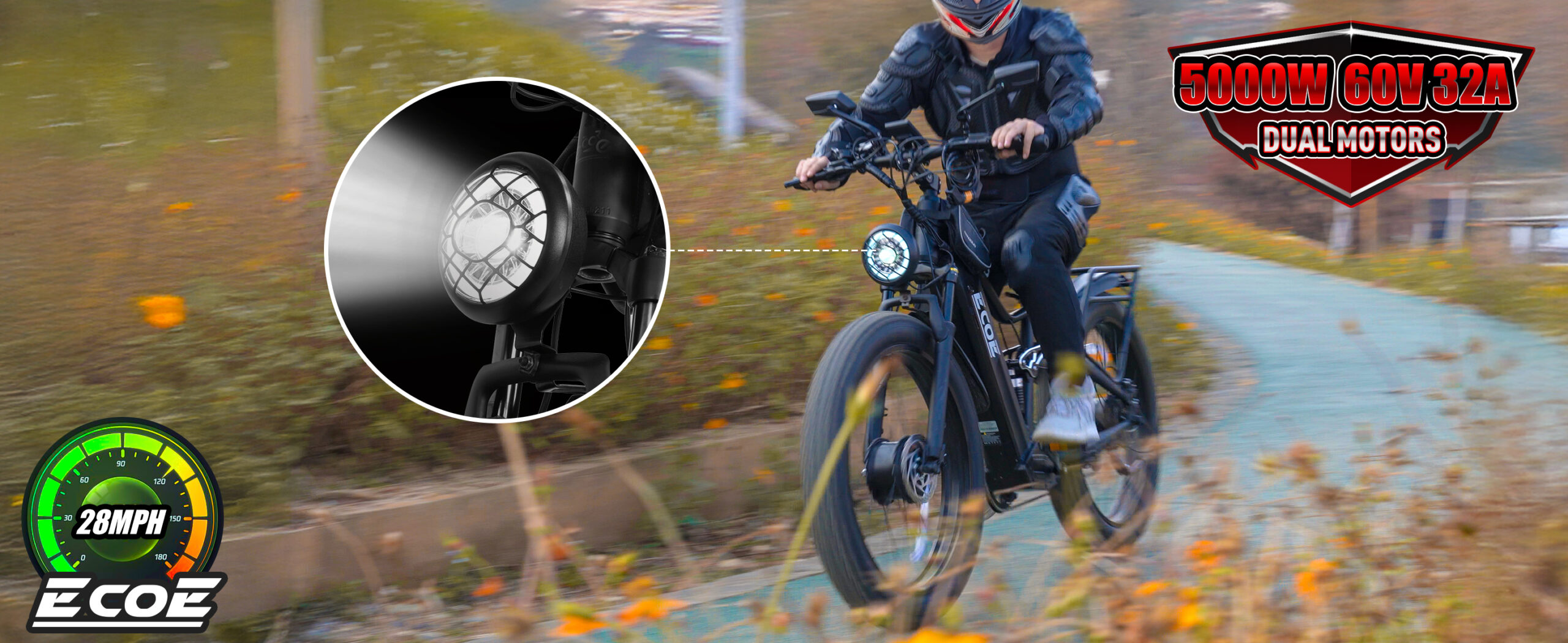
Top 15 Electric Bikes for Adults: Features, Prices, and User Reviews
With the growing popularity of electric bicycles, an increasing number of adults are opting for this green, eco-friendly, and efficient mode of transportation. This article will recommend 15 electric bicycles suitable for adults, covering a variety of designs, functions, and price ranges to help you make an informed decision. Additionally, we will share real user feedback to give you an in-depth understanding of the strengths and experiences of each model. As the global demand for eco-friendly and efficient transportation continues to rise, electric bicycles have become the ideal choice for many adults. They not only offer convenient and quick commuting experiences but also improve health, save on transportation costs, and add more fun to daily life. When choosing an electric bicycle, factors such as functionality, price, and user experience need to be considered comprehensively. This article will recommend 15 high-cost-performance electric bicycles suitable for adults to help you find the perfect one for yourself. 1. Ecoe 5000W Dual Motor Electric Bike Features: Price: $1,499 User Reviews: Users generally give high praise to the power performance and comfort of this electric bicycle. It particularly excels on uneven roads and mountainous terrain. Many users report that the battery range is very satisfactory even for long-distance rides. 2. Rad Power Bikes RadRover 6 Plus Features: Price: $1,899 User Reviews: Users of the RadRover 6 Plus say that this electric bicycle is perfect for daily commuting and light off-road riding. The battery range is sufficient for long rides in the city, and the comfortable seat and suspension system make the ride much easier. 3. Merax 26” Electric Mountain Bike Features: Price: $639 User Reviews: Users generally consider the Merax electric mountain bike to be a good value for money, especially for riders on a budget. Although the motor power is relatively low, it is […]
Read more

Technical Development and Future Potential of Autonomous Electric Bicycles
The EcoE 5000W electric bike Powerful Motor: EcoE is equipped with a 60V 5000W high-speed brushless motor. Due to different loads and road conditions, the electric bike drive system provides adjustable assistance, allowing you to stay healthy, relax, and exercise.Accessories: This electric bike accessory set includes a rearview mirror, water bottle holder and bottle, a sturdy phone mount, and a waterproof phone pouch. The reinforced cargo rack allows you to easily carry extra items needed for your ride. Additionally, if you need more accessories, you can purchase a detachable storage rack, passenger safety seat, trailer, and more.60V 32AH Battery: The bike is equipped with a high-capacity, removable 32AH battery, providing longer range per charge and over 1000 charge cycles. With pedal assist, the fat tire e-bike can travel 35-80 miles, depending on riding mode, load, and terrain. You can also purchase a spare battery for extended trips.Comfort and Versatility: This fat tire electric bike comes with dual front suspension and rear shocks to reduce impact and strain during rides. Its 26-inch wheels, 4-inch tires, and SHIM 7-speed system offer excellent grip across diverse terrains. Front and rear disc brakes ensure safe, responsive stopping, whether on mountain trails or city streets. – 1. Current Technological Status Core ArchitectureAutonomous electric bicycles rely on three core modules: Typical Use Cases Model/Project Technical Configuration Functions Testing Progress NIU TQi Dual-front-wheel self-balancing system, L2 autonomous module ACC adaptive cruise, collision warning, auto-parking Mass-produced, supports urban ADAS1 Hefei Demo100 Multi-sensor fusion (LiDAR+camera+IMU), 5G communication L4 autonomous navigation in closed zones Scheduled for 2025 pilot2 Wuhan Snail-Radar 4D radar SLAM dataset (e-bike platform) High-precision localization in harsh environments Open-source for academic research17 Key Technological Breakthroughs 2. Challenges and Solutions Challenge Specific Issues Solutions Environmental Perception LiDAR signal attenuation in rain/fog, complex intersection recognition 4D radar-camera fusion (e.g., Wuhan’s Snail-Radar dataset)17 Stability […]
Read more
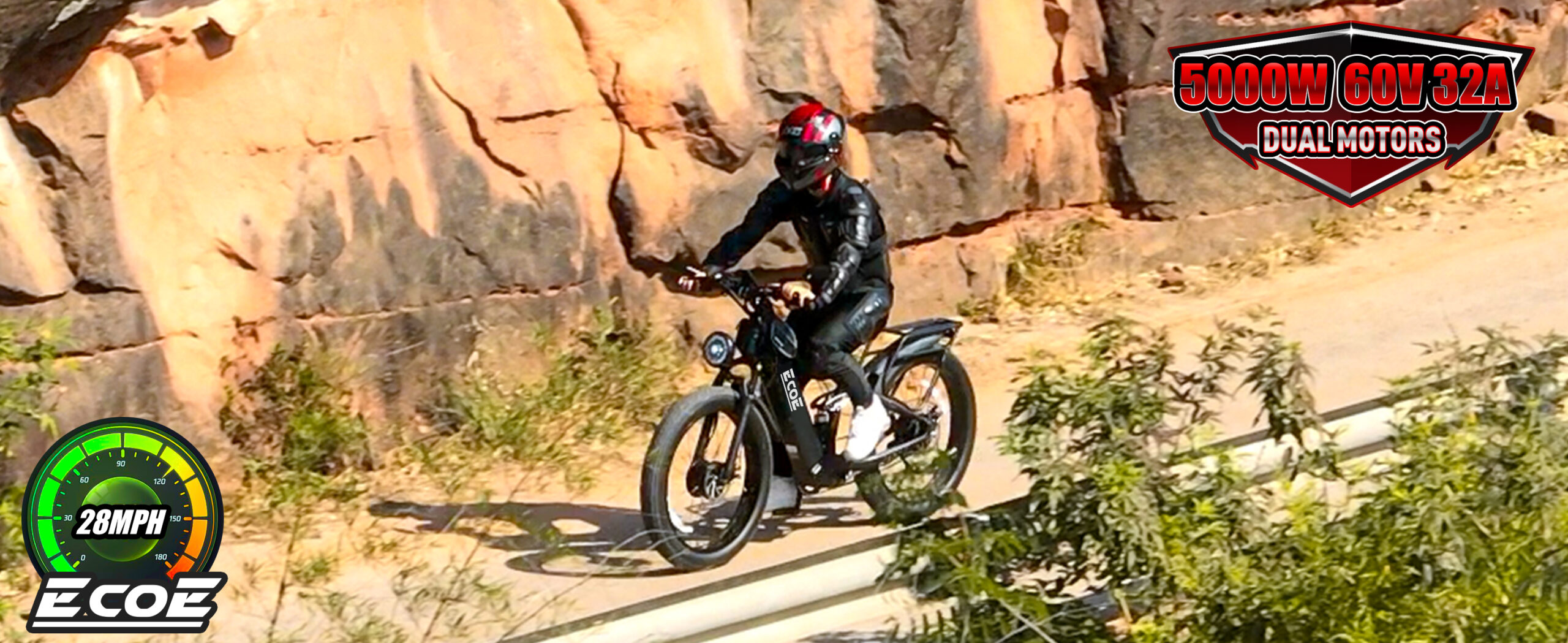
Range-Extended vs Smart Electric Bicycles
The EcoE 5000W electric bike Powerful Motor: EcoE is equipped with a 60V 5000W high-speed brushless motor. Due to different loads and road conditions, the electric bike drive system provides adjustable assistance, allowing you to stay healthy, relax, and exercise.Accessories: This electric bike accessory set includes a rearview mirror, water bottle holder and bottle, a sturdy phone mount, and a waterproof phone pouch. The reinforced cargo rack allows you to easily carry extra items needed for your ride. Additionally, if you need more accessories, you can purchase a detachable storage rack, passenger safety seat, trailer, and more.60V 32AH Battery: The bike is equipped with a high-capacity, removable 32AH battery, providing longer range per charge and over 1000 charge cycles. With pedal assist, the fat tire e-bike can travel 35-80 miles, depending on riding mode, load, and terrain. You can also purchase a spare battery for extended trips.Comfort and Versatility: This fat tire electric bike comes with dual front suspension and rear shocks to reduce impact and strain during rides. Its 26-inch wheels, 4-inch tires, and SHIM 7-speed system offer excellent grip across diverse terrains. Front and rear disc brakes ensure safe, responsive stopping, whether on mountain trails or city streets. – Dimension Range-Extended Electric Bicycles Smart Electric Bicycles Power System Battery + Range Extender (Fuel/Gas Generator) Pure Electric Drive (No Range Extender) Key Advantages 1. Long range (150–300km with fuel extender)2. No charging anxiety3. Better cold performance 1. Advanced smart features (APP control, anti-theft, auto-parking)2. Personalized user experience Key Disadvantages 1. Heavy weight (5–10kg extra)2. High maintenance costs3. Noise from the generator 1. Dependent on network and hardware2. Potential signal failures in extreme environments Typical Use Cases Long-distance commuting, outdoor adventures, rural areas Urban short trips, shared mobility, premium users Policy Impact Classified as “hybrid vehicles” in some regions (requires fuel vehicle license) Complies […]
Read more

Electric Bikes for Adults: How They Revolutionize Daily Commutes and Lifestyles
As urban traffic becomes increasingly congested, electric bicycles are emerging as a new choice for modern adults’ transportation. They not only offer an efficient and eco-friendly way to get around but also improve health, save costs, and bring more convenience to daily life. Below, we will explore how electric bicycles are changing the daily commute and lifestyle of adults, as well as the factors to consider when choosing the right electric bicycle for oneself. In the fast-paced urban life, more and more adults are choosing electric bicycles as their daily commuting vehicle. This is not only because electric bicycles can efficiently tackle the challenges of urban traffic but also because they bring multiple benefits of convenience, environmental friendliness, and health to riders. As modern urban dwellers, choosing an electric bicycle may change our definition of transportation and even alter the way we live our daily lives. 1. How Electric Bicycles Change Daily Commuting On busy mornings, many people find themselves always rushing, cramming onto the subway or getting stuck in traffic during rush hour. However, electric bicycles offer adults a more flexible and efficient commuting option. Compared to traditional bicycles, electric bicycles, with their electric assistance systems, enable riders to easily overcome hills and long rides, maintaining speed and comfort. More importantly, they are not troubled by traffic congestion and can often navigate through busy city streets with ease. For example, the shared electric bicycle systems in many cities are gradually improving and have become the top choice for daily commuting for those who use electric bicycles in places like San Francisco and Los Angeles in the United States. Local riders report that they not only save a lot of commuting time with electric bicycles but also avoid long-term traffic stress and start the day in a good mood. 2. […]
Read more

Classification of Electric Bicycles by Regulatory Standards
The EcoE 5000W electric bike Powerful Motor: EcoE is equipped with a 60V 5000W high-speed brushless motor. Due to different loads and road conditions, the electric bike drive system provides adjustable assistance, allowing you to stay healthy, relax, and exercise.Accessories: This electric bike accessory set includes a rearview mirror, water bottle holder and bottle, a sturdy phone mount, and a waterproof phone pouch. The reinforced cargo rack allows you to easily carry extra items needed for your ride. Additionally, if you need more accessories, you can purchase a detachable storage rack, passenger safety seat, trailer, and more.60V 32AH Battery: The bike is equipped with a high-capacity, removable 32AH battery, providing longer range per charge and over 1000 charge cycles. With pedal assist, the fat tire e-bike can travel 35-80 miles, depending on riding mode, load, and terrain. You can also purchase a spare battery for extended trips.Comfort and Versatility: This fat tire electric bike comes with dual front suspension and rear shocks to reduce impact and strain during rides. Its 26-inch wheels, 4-inch tires, and SHIM 7-speed system offer excellent grip across diverse terrains. Front and rear disc brakes ensure safe, responsive stopping, whether on mountain trails or city streets. – Type Parameter Requirements Advantages Disadvantages Ideal Use Cases License Required China Electric Bicycle (Non-Motorized) Max speed ≤25km/h, motor power ≤400W, weight ≤63kg (lead-acid), Beidou positioning (mandatory for commercial use) No license required, low cost, suitable for short commutes Limited speed and range (30–60km) Urban commuting, student/office use, community services None Light Electric Motorcycle (Motorized) Max speed ≤50km/h, motor power ≤4kW, 3C certification required Faster speed (30–50km/h), suitable for medium-distance travel, passenger-carrying allowed (region-dependent) Requires license (F/E), insurance, restricted in some cities (e.g., Beijing Fifth Ring Road) City commuting, food delivery, logistics F/E License Electric Motorcycle (Motorized) Max speed >50km/h, motor power >4kW, 3C […]
Read more
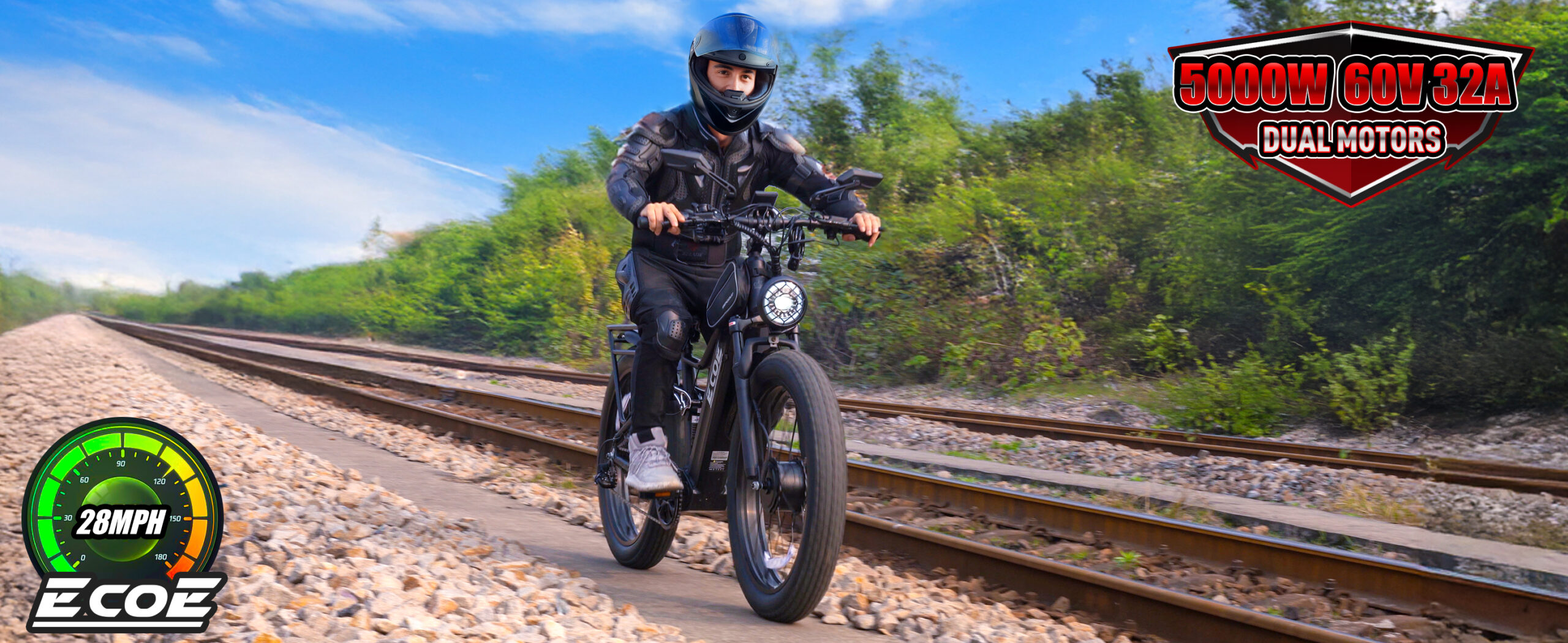
Classification and Comparison of Electric Bicycle Battery Types
The EcoE 5000W electric bike Powerful Motor: EcoE is equipped with a 60V 5000W high-speed brushless motor. Due to different loads and road conditions, the electric bike drive system provides adjustable assistance, allowing you to stay healthy, relax, and exercise.Accessories: This electric bike accessory set includes a rearview mirror, water bottle holder and bottle, a sturdy phone mount, and a waterproof phone pouch. The reinforced cargo rack allows you to easily carry extra items needed for your ride. Additionally, if you need more accessories, you can purchase a detachable storage rack, passenger safety seat, trailer, and more.60V 32AH Battery: The bike is equipped with a high-capacity, removable 32AH battery, providing longer range per charge and over 1000 charge cycles. With pedal assist, the fat tire e-bike can travel 35-80 miles, depending on riding mode, load, and terrain. You can also purchase a spare battery for extended trips.Comfort and Versatility: This fat tire electric bike comes with dual front suspension and rear shocks to reduce impact and strain during rides. Its 26-inch wheels, 4-inch tires, and SHIM 7-speed system offer excellent grip across diverse terrains. Front and rear disc brakes ensure safe, responsive stopping, whether on mountain trails or city streets. – Type Advantages Disadvantages Application Scenarios Notes Lead-Acid Low cost, high safety, overcharge resistance, easy recycling Heavy (15-30kg), low energy density (30-50Wh/kg), short cycle life (300-500 cycles) Entry-level commuter bikes, cargo bikes Requires regular maintenance; poor cold performance Lithium-Ion Lightweight (3-8kg), high energy density (100-260Wh/kg), long cycle life (500-1000 cycles) High cost, fire risk at high temperatures, requires special charger High-end commuter bikes, folding bikes Avoid overcharging/discharging Lithium Iron Phosphate Extremely safe, high temperature resistance, very long cycle life (2000+ cycles) Poor cold performance, lower energy density (120-170Wh/kg), heavier (8-12kg) Long-range electric vehicles, shared bikes Better for high-temperature environments Nickel-Metal Hydride Eco-friendly, overcharge resistance, […]
Read more

Expert’s Guide to Electric Bikes for Adults: What to Look for in 2025
When choosing an electric bicycle suitable for adults, it is crucial to understand the latest technological trends and future development directions. Here are some key factors to help you make an informed decision in 2025: 1. Types of Electric Bicycles Pedelec (Pedal-Assist Electric Bicycle): The motor provides assistance when you pedal, enhancing the riding experience. Throttle-Controlled Electric Bicycle: Equipped with a throttle that allows for starting and accelerating without pedaling. Full-Power Electric Bicycle: Entirely driven by the motor, eliminating the need for manual pedaling. 2. Motor Types and Placement Hub Motor: Installed in the front or rear wheel, providing direct drive with simple maintenance. Mid-Drive Motor: Located near the pedal axle, offering balanced weight distribution and a natural riding feel. 3. Battery Capacity and Range Capacity: Typically measured in watt-hours (Wh), affecting the battery’s energy storage capability. Range: Depends on battery capacity, riding conditions, and assistance level. Choose a range that meets your daily riding needs. 4. Technological Integration Smart Features: Such as smartphone-connected apps that provide navigation, cycling statistics, and anti-theft functions. Adjustable Assistance Modes: Tailor the assistance level according to terrain and riding needs. 5. Regulations and Restrictions Speed Limits: Be aware of local speed limits and classification regulations for electric bicycles. Usage Areas: Some areas may restrict the use of electric bicycles, especially on unpaved roads or in specific parks. Additional Considerations Lightweight Design: Manufacturers are focusing on developing lighter electric bicycles to enhance portability and handling. Enhanced Battery Technology: Newer batteries offer longer lifespans and faster charging speeds. Integrated Systems: Electric bicycles are evolving towards higher integration, cleverly incorporating batteries and motors into the frame design. Before making a purchase, it is recommended that you test ride different models to assess comfort, handling, and features that meet your needs. With continuous technological advancements, electric bicycles in […]
Read more
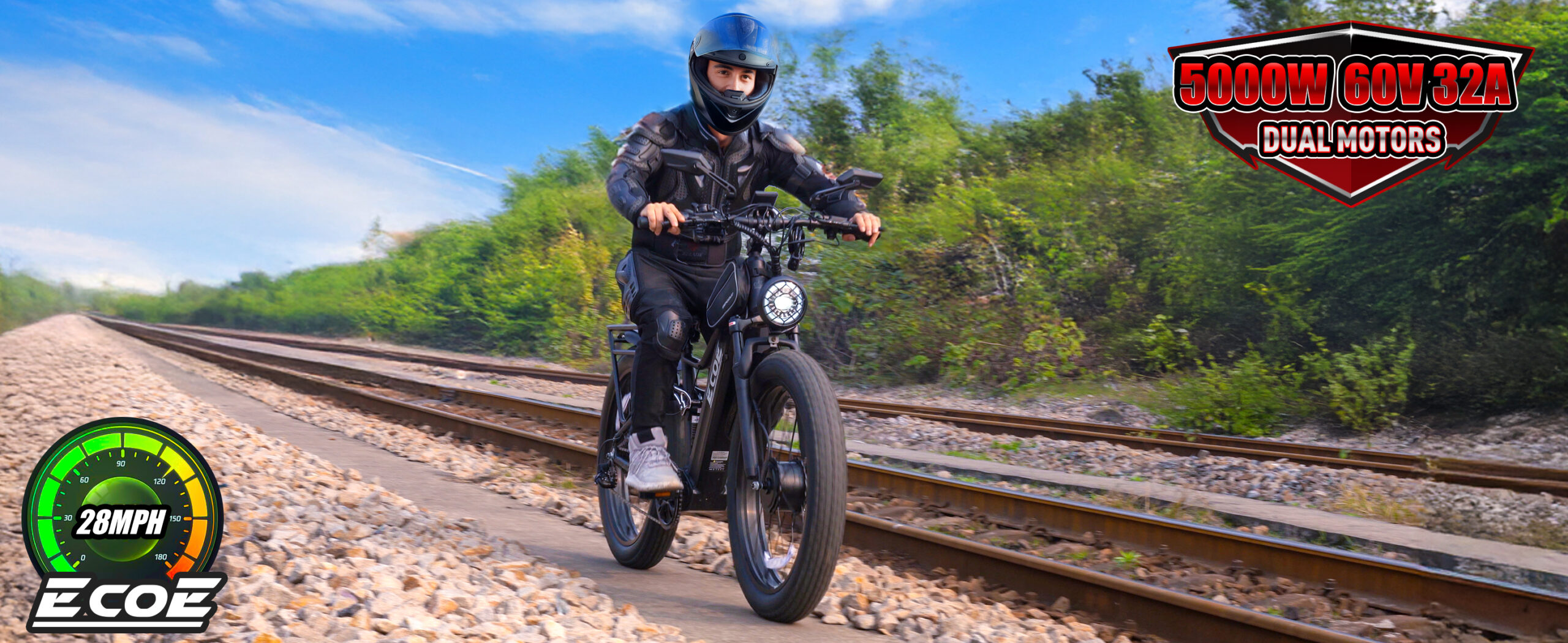
The Rise of Electric Bikes for Adults: Benefits for Health, Environment, and Wallet
As urban transportation continues to evolve, electric bicycles are rapidly becoming the preferred tool for adult commuting and leisure. They not only enhance the convenience of cycling but also bring significant benefits in terms of health, environment, and economy. In recent years, we have witnessed the growing popularity of electric bicycles among adults. Behind this trend lies a pursuit of benefits in health, environment, and economy. Health Benefits Many people might think that electric bicycles reduce the amount of exercise compared to traditional cycling, but this is not the case. Studies have shown that riding an electric bicycle still provides moderate-intensity exercise, which helps improve cardiovascular health, control weight, and enhance overall muscle strength. For those who may be limited by physical fitness and unable to engage in traditional cycling, electric bicycles offer a viable alternative, allowing them to enjoy the pleasure of cycling while reaping health benefits. Environmental Impact In terms of the environment, electric bicycles also have significant advantages. Compared to traditional gasoline-powered cars, electric bicycles produce much lower carbon emissions, contributing to reduced air pollution and greenhouse gas emissions. Additionally, electric bicycles are more energy-efficient, and their production process has a relatively smaller environmental impact. Choosing an electric bicycle as a daily mode of transportation is one of the practical contributions we can make to protect the environment. Economic Advantages From an economic perspective, electric bicycles save us a considerable amount of transportation costs. Compared to the high costs of owning and maintaining a car, the purchase and maintenance expenses of electric bicycles are much lower. Moreover, many cities provide dedicated lanes and parking facilities for electric bicycles, further reducing commuting costs and time. In the long run, an electric bicycle is undoubtedly a wise investment. In practical use, many users have also shared their positive experiences. […]
Read more

Classification of Electric Bicycles by Structural Design
The EcoE 5000W electric bike Powerful Motor: EcoE is equipped with a 60V 5000W high-speed brushless motor. Due to different loads and road conditions, the electric bike drive system provides adjustable assistance, allowing you to stay healthy, relax, and exercise.Accessories: This electric bike accessory set includes a rearview mirror, water bottle holder and bottle, a sturdy phone mount, and a waterproof phone pouch. The reinforced cargo rack allows you to easily carry extra items needed for your ride. Additionally, if you need more accessories, you can purchase a detachable storage rack, passenger safety seat, trailer, and more.60V 32AH Battery: The bike is equipped with a high-capacity, removable 32AH battery, providing longer range per charge and over 1000 charge cycles. With pedal assist, the fat tire e-bike can travel 35-80 miles, depending on riding mode, load, and terrain. You can also purchase a spare battery for extended trips.Comfort and Versatility: This fat tire electric bike comes with dual front suspension and rear shocks to reduce impact and strain during rides. Its 26-inch wheels, 4-inch tires, and SHIM 7-speed system offer excellent grip across diverse terrains. Front and rear disc brakes ensure safe, responsive stopping, whether on mountain trails or city streets. – Structural Type Subtypes Description Advantages Disadvantages Ideal Use Cases Cost Range Standard Frame Traditional Diamond Frame Resembles a conventional bicycle with a rigid diamond-shaped frame. Balanced weight distribution, easy maintenance, compatible with accessories. Limited cargo capacity, less stable at high speeds. Daily commuting, casual rides, entry-level users. $300–$1,500 Step-Through Frame Low-top tube design for easy mounting/dismounting, often with rear storage. Enhanced accessibility, ideal for riders in skirts or heavy clothing. Weaker frame rigidity, limited off-road capability. Urban commuting, senior riders, short-distance errands. $400–$2,000 Folding Frame Compact Foldable Frame collapses for storage in small spaces (e.g., under desks or in car trunks). Ultra-portable, fits […]
Read more
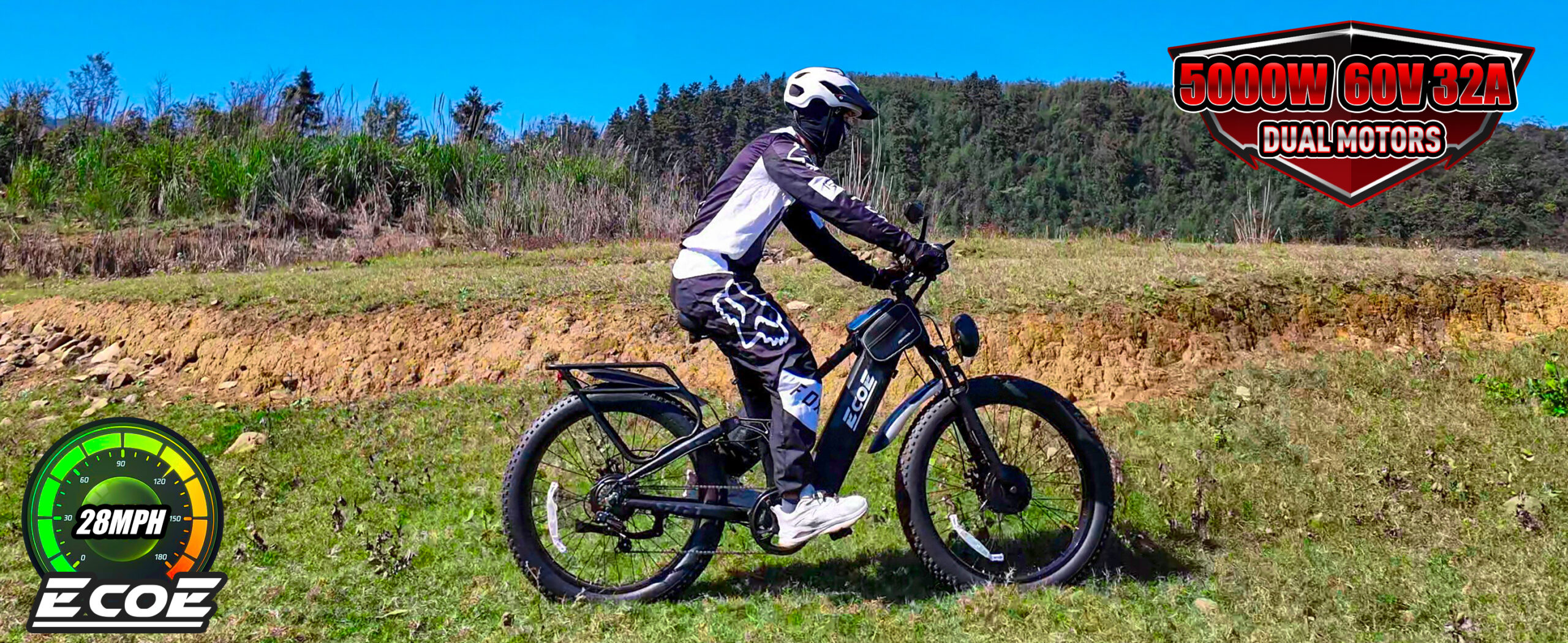
Classification of E-bikes by Usage and Their Advantages/Disadvantages
The EcoE 5000W electric bike Powerful Motor: EcoE is equipped with a 60V 5000W high-speed brushless motor. Due to different loads and road conditions, the electric bike drive system provides adjustable assistance, allowing you to stay healthy, relax, and exercise.Accessories: This electric bike accessory set includes a rearview mirror, water bottle holder and bottle, a sturdy phone mount, and a waterproof phone pouch. The reinforced cargo rack allows you to easily carry extra items needed for your ride. Additionally, if you need more accessories, you can purchase a detachable storage rack, passenger safety seat, trailer, and more.60V 32AH Battery: The bike is equipped with a high-capacity, removable 32AH battery, providing longer range per charge and over 1000 charge cycles. With pedal assist, the fat tire e-bike can travel 35-80 miles, depending on riding mode, load, and terrain. You can also purchase a spare battery for extended trips.Comfort and Versatility: This fat tire electric bike comes with dual front suspension and rear shocks to reduce impact and strain during rides. Its 26-inch wheels, 4-inch tires, and SHIM 7-speed system offer excellent grip across diverse terrains. Front and rear disc brakes ensure safe, responsive stopping, whether on mountain trails or city streets. – 1. Commuter E-bikes 2. Mountain E-bikes 3. Folding E-bikes 4. Cargo E-bikes 5. Sport/Racing E-bikes 6. Urban Leisure E-bikes Comparison Table Type Purpose Advantages Disadvantages Suitable Scenarios Commuter Daily travel Long range, comfort, storage Plain design, moderate load Urban commuting Mountain Off-road cycling Suspension, climbing, durability Heavy, costly Mountain trails Folding Portable use Compact, lightweight, foldable Short range, limited load Public transport Cargo Cargo delivery High load, long battery, storage Bulky, expensive Logistics, moving Sport/Racing Competitive cycling High speed, lightweight, gears Uncomfortable, battery-dependent Sports events Urban Leisure Leisure activities Stylish, stable, two-person option Weak power, low load Park rides, sightseeing
Read more






